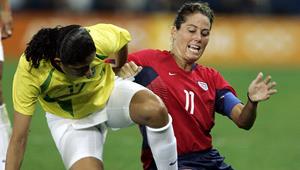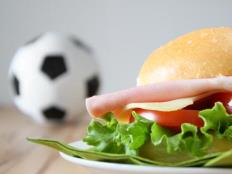
Our bodies are like a finely tuned engine that needs to be fueled with the right mix of nutrients for optimal performance. This is especially important for soccer, where you are relying on your body for those sprints up the field and fast-paced tackles.
Foods are made up of food groups, namely carbohydrates for energy, protein for growth and recovery, fats for energy and water for hydration. That doesn't even mention vitamins and minerals for growth and many other of our body's functions.
Let's start with carbohydrates, the most important fuel for contracting muscles. In fact, our body has its very own storeroom supply of this--called glycogen--in the muscles. Once the blood's supply is used up it will turn to this reserve to break down. Carbohydrates are found in bread, rice, pasta and cereals. Whole grain varieties of these are a better choice as they are broken down at a slower rate and will give longer lasting energy.
Next is protein, which is found in meat, fish, beans, nuts and lentils. Protein is needed to repair and rebuild muscles that have been damaged during exercise. It's important to note that you don't need to overdo this.
Fat is found in meat, butter, dairy, convenience food and oils. Try to choose monounsaturated fats such as olive oil or canola oil and eliminate trans fats. It will protect your heart and maintain healthy cholesterol levels.
You want to ensure that the meals you eat give you the most nutritional bang for your buck. A healthy meal should be made up of 2/3 whole grains, fruits and vegetables and 1/3 low fat meat, dairy, beans or other protein-rich foods. Fast foods have very little nutritional value and, in turn, will hinder performance on the field. However they can be part of a healthy sports diet as an occasional treat.
It is vital to fuel your body on a regular basis, having three nutritious meals a day with snacks. Make time for meals, as they are just as vital as the training session.
A good meal plan would be:
- Breakfast: whole-grain cereal, low-fat milk and fruit
- Snack: yogurt and granola
- Lunch: whole-grain bread with tuna and a glass of milk
- Supper: chicken, potato and greens
On a final note, focus on getting enough water for hydration. To find out how much water you need, weigh yourself before and after the match. For every pound lost, you need at least 16-24 ounces of water. This is especially important in hot weather, where you lose a lot of water through your sweat and have a higher chance of becoming dehydrated.
Also, make sure you are getting enough iron found in red meats and iron-fortified cereal to prevent anemia--often common in female soccer players. Anemia will cause fatigue and hinder your ability to play. Try to drink orange juice or have vegetables rich in vitamin C with meals to aid iron absorption.
Have a sensible pre-workout snack like a peanut butter sandwich and refuel afterwards. Some good choices would be a fruit smoothie, sandwich, chocolate milk or cereal and milk to replenish glycogen stores and protein for tired muscles.
Finally, consider consulting a dietitian to give you advice to get the most out of your game.
 See more soccer drills & tips or find a soccer camp near you.
See more soccer drills & tips or find a soccer camp near you.






Discuss This Article